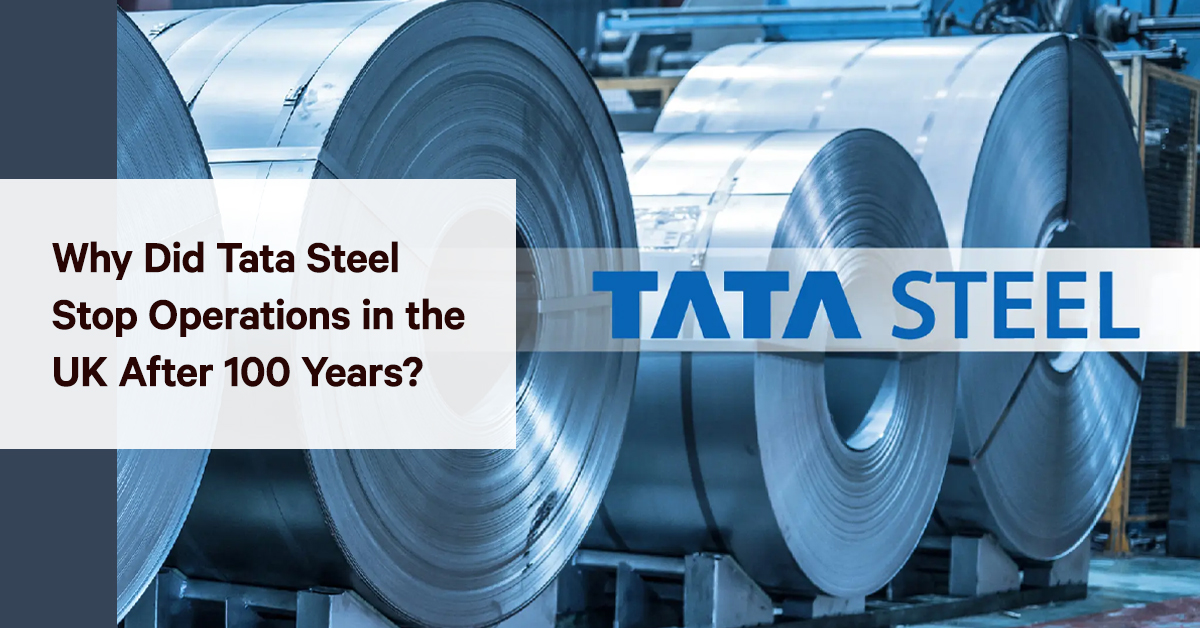For over a century, Tata Steel has been a key part of UK industry, shaping the economy and providing employment to thousands. Its decision to stop operations in the UK came as a big blow to the steel industry, marking the end of an era. While the global steel market has been struggling for some time, Tata Steel’s decision to halt its operations in the UK has raised concerns over the future of UK steel manufacturing. In this blog, we’ll look at the key factors behind this decision and what it means for the UK’s industrial future.
The history of Tata Steel in the UK
Tata Steel, part of the Tata Group, is a global steel manufacturing giant that made its first major entrance into the UK market in 2007 when it acquired Corus Group, the second-largest steel producer in Europe at the time. Corus was born out of the British Steel Corporation, a historic name in the UK’s industrial heritage. This acquisition was seen as a positive step for the UK steel industry, bringing significant investment and optimism for a brighter future in a rapidly globalising market.
However, the steel industry has faced several hurdles in recent decades, both in the UK and globally. Despite Tata Steel’s efforts to modernise and sustain the UK business, persistent financial losses and a challenging market environment forced the company to reassess its long-term strategy. After years of battling declining profits, Tata Steel stopped operations in the UK, shocking employees, industry stakeholders and the wider community.
Economic pressures on the global steel industry
The global steel industry has faced relentless pressure for more than a decade. The 2008 financial crisis triggered a sharp contraction in demand for steel products, as construction and manufacturing projects were put on hold or cancelled altogether. Steel prices, which had been high before the crisis, plummeted. In the years that followed, the European steel market, including the UK, saw a slow recovery while being exposed to increasing competition from cheaper international producers, especially from China.
China’s steel production boomed, and its low-cost steel flooded the global market, pushing prices further down. In the face of rising imports of inexpensive steel, UK producers, including Tata Steel, found it difficult to remain competitive. Despite efforts to reduce costs and increase efficiency, the price pressures proved overwhelming for Tata Steel’s UK operations, which consistently operated at a loss.
High energy costs and environmental regulations
Another major factor that contributed to Tata Steel’s decision to stop operations in the UK was the rising energy costs. The steelmaking process is energy-intensive, requiring vast amounts of electricity and gas. Unfortunately, the UK’s energy prices have been among the highest in Europe, further squeezing margins for steel producers.
What’s more, UK steel producers face stringent environmental regulations aligned with the government’s climate change goals, which impose significant costs. While reducing carbon emissions is essential, these regulations placed further financial strain on Tata Steel’s already struggling UK operations. The expense of meeting these standards, and upgrading facilities to comply with climate targets, added to the company’s challenges, making profitability even harder to achieve.
Uncertainty around Brexit
The uncertainty surrounding Brexit also influenced Tata Steel’s decision to halt operations in the UK. The steel industry relies heavily on access to European markets, with much of its output exported to EU countries. However, Brexit introduced uncertainty regarding trade agreements, tariffs and customs regulations. Although a deal was eventually reached, the prolonged uncertainty affected business planning and investment decisions across industries, including steel. For Tata Steel, Brexit heightened the risks of continuing operations in the UK, as concerns over tariffs, border checks and regulatory divergence complicated the outlook for profitability.
The impact on UK jobs and communities
Tata Steel’s stopping operations in the UK has had social consequences, particularly in communities where steel production was the main source of employment. Towns like Scunthorpe, Port Talbot and others have historically relied on the steel industry to provide stable, well-paying jobs. The closure of steel plants and the reduction of Tata Steel’s UK presence have put thousands of jobs at risk, with a devastating impact on the local economies.
While the government has stepped in at times to offer support, including temporary financial aid packages and discussions of potential buyouts by third parties, these measures have only delayed the inevitable. The challenge of finding new employment for former steelworkers remains a hurdle for affected communities, leading to increased pressure on local services and economies.
What’s next for the UK steel industry?
The decision by Tata Steel to stop operations in the UK raises questions about the future of the UK’s steel industry. Can the UK steel sector survive in the face of global competition, rising costs, and increased regulatory pressure? Will government intervention be enough to preserve what remains of the industry?
The UK government has announced its commitment to supporting the steel industry, including investment in green steel technologies that reduce carbon emissions and make production more sustainable. However, transitioning to greener production methods requires substantial investment, time and political will. Whether these efforts will be enough to prevent the further decline of steelmaking in the UK remains to be seen.
The end of an era
Tata Steel’s decision to stop operations in the UK after 100 years marks the end of an important chapter in the country’s industrial history. The global steel market’s volatility, combined with high energy costs, strict environmental regulations, and the uncertainty brought about by Brexit, all contributed to this difficult decision. While it’s a big loss for the UK, it also reflects broader trends within the global steel industry, where competitive pressures and market forces are driving change at a rapid pace.
As we look ahead, the future of UK steel will depend on innovation, investment in green technology and effective government support. The industry will need to evolve to survive, and communities dependent on steel production will need support transitioning to new economic opportunities.
Ask an expert
If your business is facing financial difficulties or you’re concerned about the implications of industry changes like those seen in steel manufacturing, professional insolvency advice can help guide you through these challenging times. Contact our expert team today for a free, confidential consultation. Call us on 0800 246 1845 or email us at mail@leading.uk.com to explore your options and find out how we can support you.






